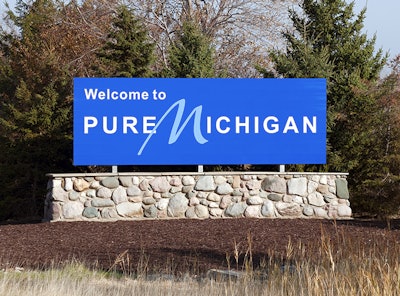
Michigan’s Department of Licensing and Regulatory Affairs (LARA) will allow existing medical marijuana dispensaries to operate without licenses until Dec. 15 .
In a press release from Sept. 12, LARA announced it informed the state’s Medical Marijuana Licensing Board on the implementation of regulations for the Medical Marijuana Facility Licensing Act (MMFLA).
LARA will begin accepting license applications for all medical marijuana facilities on Dec. 15, according to the release, and any business operating that would require a license under the MMFLA will risk not obtaining one if they are operating after that date.
“The department will not shut down facilities,” said Medical Marijuana Regulation Director Andrew Brisbo. “However, continued operation by a facility is a business risk for two reasons. One, they may be shut down by law enforcement. Two, they may be denied licensure since applicants will be required to disclose any and all previous operations in the application.”
Brief Background, Concerns About New Law
The state legalized medical marijuana in 2008, but in 2013, the state’s Supreme Court mandated that only caregivers could distribute cannabis to up to five registered patients, said Matthew Abel, an attorney, the executive director for Michigan’s NORML and a board member for MI Legalize.
“There was no notice that there was any restriction on those transfers,” Abel said. “The dispensaries that already were in existence when that decision came down were put in a precarious position, and some of them closed and others stayed open.”
Abel said some municipalities then licensed and zoned what some cities consider dispensaries and others consider “caregiver centers.” As an attorney, Abel represents these businesses, which are places where caregivers can meet their five registered patients to do legal transfers . However, he says, some caregiver centers sell to anyone with a medical marijuana card, which is illegal under state law.
The MMFLA, passed last year, mandates that all dispensaries must be licensed by the state. The governor has appointed a five-member board to enforce regulations set by LARA.
Before the Sept. 12 meeting, the state’s dispensaries risked immediate closure until licenses are issued next year, Abel said. Medical Marijuana Licensing Board Member Donald Bailey, a retired State Police sergeant who formerly worked in drug enforcement, said he did not want dispensaries putting marijuana into the black market, and questioned whether LARA was cracking down enough on dispensaries that he believes have been operating illegally, as reported by The Detroit News.
Board members also raised concerns about testing, Abel said, indicating that perhaps dispensaries should not be operational without testing labs in place to determine that the cannabis they sell is safe. Abel argued that although everyone wants tested medicine, Michigan’s patients have been using untested products since medical marijuana was initially legalized in the state without ill effects.
Abel noted that there has been no testing throughout the state for the past eight years, and also pointed out that not many caregivers have had the resources to send batches to labs for testing under the state’s caregiver model. He also said that although there may be enough marijuana in the state to supply all of the patients, the caregiver system is not an effective distribution model to get the product to the patients.
Transitioning to Legal Operation
LARA’s decision to permit dispensaries to operate until Dec. 15 is part of a transitional plan, Abel said, where they can remain open until the application process begins and apply to be legally licensed to operate beyond that time.
“The moral end of it is that there are thousands of patients who have been obtaining their medicine from these provisioning centers or dispensaries, and the state feels that if they just give people 90 days’ notice, that they can then find a caregiver. Well, that’s not necessarily true.” - Attorney Matthew Abel
“This approach will allow existing operations to wind down while also giving adequate time for patients to establish connections to caregivers in order to ensure continuity of access. Neither patients nor product will be forced into the black market; rather, patients will have time to return to the caregiver-patient model,” said Bureau of Medical Marijuana Regulation spokesperson David Harns.
State law says that if an applicant has been charged with infractions or has been found to have violated the law in any way, it is a factor used when considering whether to issue them a license, Abel said. He says even if a dispensary closes by the Dec. 15 deadline, it is problematic because it is an admission that the dispensaries have been operating illegally, which complicates the system.
Abel advises his clients to remain open at their own risk, and believes the best way to handle the situation is to start over and file a new application with a new business.
“That’s the legal end of it,” he said. “The moral end of it is that there are thousands of patients who have been obtaining their medicine from these provisioning centers or dispensaries, and the state feels that if they just give people 90 days’ notice, that they can then find a caregiver. Well, that’s not necessarily true.”
Abel said that caregivers usually do not have the equipment needed to produce the high-quality concentrates and other products that many patients need.
“They might be able to get an ounce somewhere, but are they going to be able to get a 50/50 THC/CBD oil in capsules that they can take three times a day? Probably not,” he said.
LARA estimates that licenses will not be issued until the first quarter of 2018, per the Detroit Free Press, leaving many patients and dispensaries fearful of losing access to medical marijuana in the meantime.
As of 2016, there were nearly 219,000 medical marijuana cardholders in Michigan, WLNS reports. The state will issue five types of licenses next year, according to the Detroit Free Press, including grower, processor, transporter, testing facility and dispensary.
In the Meantime in Michigan
Abel believes more needs to be done in the meantime to ensure that patients have continued access to their medicine.
“I think rightfully this demands a legislative fix where the legislature needs to go in and somehow authorize temporary operation of dispensaries,” he said.
Abel said the state legislature could either allow any facility that holds a municipal license and is not in violation of the law to remain open without having it used against them in the licensing process, or they could go back and address the Supreme Court’s decision to allow only caregivers to legally sell medical marijuana to patients.
“[The state] said that patients have the right to obtain their medicine wherever they want legally, but that the person who is transferring it to them is protected only if they are a caregiver registered to that person through the department,” Abel explained. “So the law is asymmetrical in that a person who has a patient card can go buy it anywhere—in the street, at a dispensary, from a caregiver—but the person who is selling it to them is committing a felony unless they’re the caregiver.”
Abel said allowing non-caregivers to legally sell medical marijuana to patients until licensed dispensaries are operational would give patients continued access to their medicine. He expects the first dispensaries to be up and running in April, but unless the state allows them an emergency supply of cannabis, the first crops will have only begun growing in April, meaning that patients will not be able to buy medical marijuana again until July or August, after the first harvest.
Top photo: © Wellesenterprises | iStockPhoto.com
























